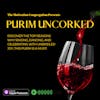The Entitlement Trap: Finding True Joy in the Practice of Gratitude
Have you ever felt like happiness was out of reach, no matter how much you had? Join us as we explore the dangerous trap of entitlement and the transformative power of gratitude. Our lively discussion unpacks how a simple shift in perspective can profoundly alter our emotional landscape. We dive into the wisdom of the great Imri Emes, illuminating the traditional offerings of Karbon Shelamim and Karbon Todah and how these practices underscore the timeless importance of appreciation in our spiritual journey.
In a world where entitlement can silently corrode our well-being, we share the secret to a fulfilling life: embracing gratitude. We reveal the beauty of starting each day with the words "Modei Ani," a heartfelt thanks for the gift of life and love. Our conversation is more than talk; it's a roadmap to a more joyous existence, recognizing the everyday miracles that warrant a fresh "thank you" with every sunrise. This episode isn't just a lesson—it's an invitation to transform your life by cultivating a heart of hakaras ha-tov, recognizing good.
Join the WhatsApp community for daily motivational Torah content! JOIN HERE
----------------
- SUBSCRIBE to The Weekly Parsha for an insightful weekly shiur on the Parsha of the week.
- Listen on Spotify or the new Jewish music and Podcast streaming platform 24six!
- Access all Torah talks and listen to featured episodes on our new website, themotivationcongregation.org
----------------
Questions or Comments? Please email me @ michaelbrooke97@gmail.com
If you're looking for a life filled with misery and pain, I have your answer. It is to have an outlook and mindset on life of entitlement. Of course God will give me another breath. Of course I will receive my soul tomorrow morning. Who cares that my wife made me dinner? Everyone's God gives them breath in their lungs and everyone's wife gives them dinner. That's not anything special, but that is the fast track to a life of misery and pain.
Speaker 1:
But gratitude, but waking up and with excitement, exclaiming Moda Ani, thank you, hashem, and telling your spouse thank and acknowledging them. That is the most easy way to recognize your blessings and to be happy. And this segues beautifully into one of the most iconic ideas from the great Imri MS, one of the great Gerareves, and that he found what seems like a contradiction in that, the carbon sholomim that's talked about in Parshat Tzav. There's a certain time limit. You have one day and then a night, and then another day, day, night, day in order to have it be processed to its completion, but a carbon todah, which falls underneath the category of a karbanshlamim. It is underneath that umbrella that is different. For an odd reason, you only have one day and one night.
Speaker 1:
Why the short cutoff Says the Amorimus a karbantoda. It's all about gratitude. This is the thanksgiving offering that someone recognized how much God gives them, gave to them and continues to give. So he's overjoyed that he went to the temple and he went and brought a karbantoda, a Thanksgiving offering. So of course there's an earlier cutoff, because tomorrow you don't get that day. There's new miracles and new things to be grateful for. A different moda ani needs to be said and perhaps a different karban todah brought tomorrow. You want to be happy, then say moda'ani with kavana. If you want to be happy and joyous and enjoy life, then recognize the blessings of all that Hashem does for you, all that your wife or your husband or your spouse or your grandparents do for you. Because the more hakaras ha-tov, the recognition of good that we have, the more karbon todos we will offer, the happier we will be. And then v'chol nisecha, shebecho yom imanu, we'll recognize all the miracles that Hashem does for us every single day.
New to The Motivation Congregation?
Here are some great episodes to start with.










